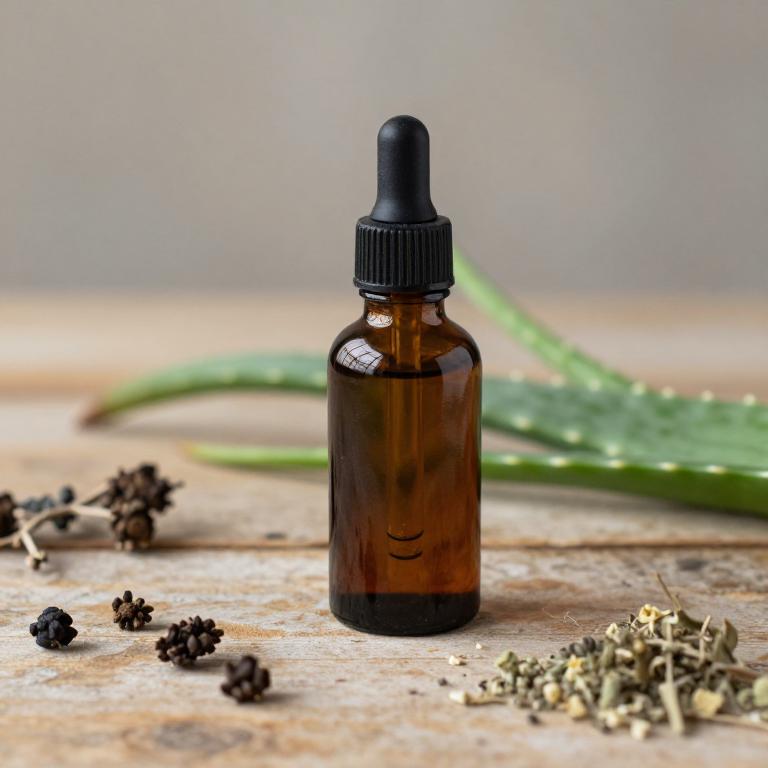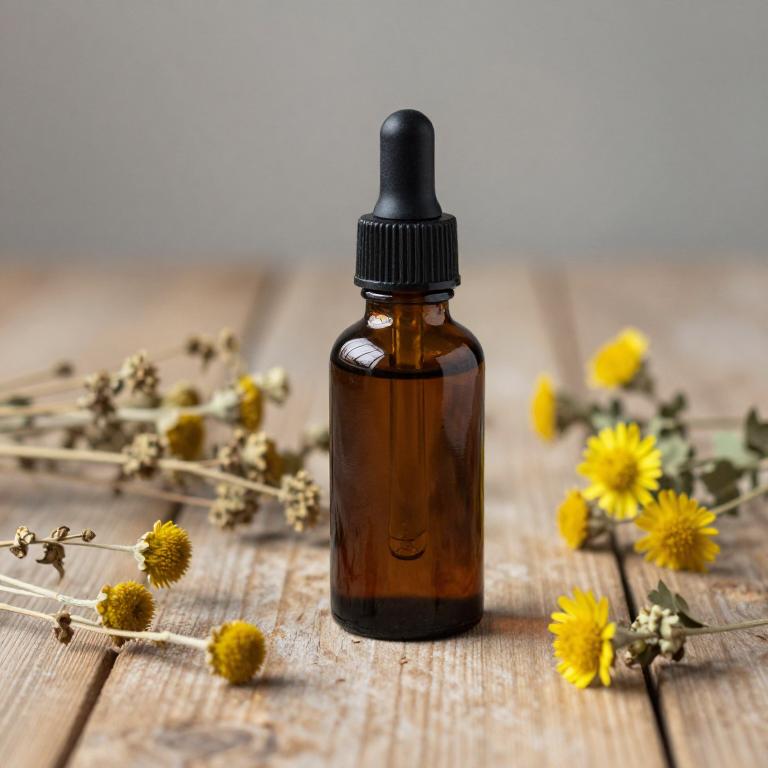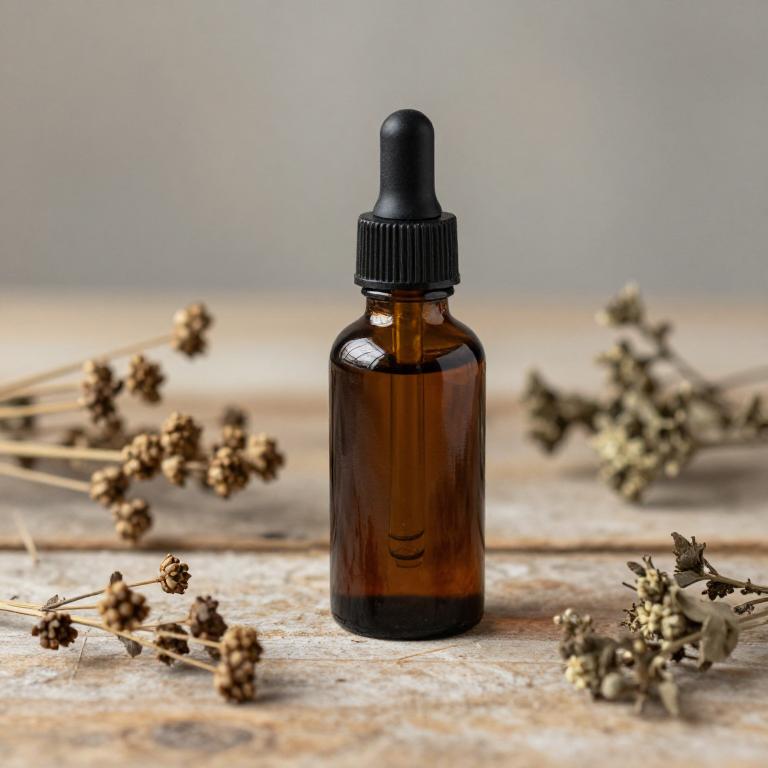10 Best Herbal Tinctures For Eczema

Herbal tinctures have gained popularity as a natural alternative for managing eczema symptoms, offering potential anti-inflammatory and soothing properties.
Commonly used herbs include calendula, chamomile, and St. John's wort, which are known for their skin-soothing effects. These tinctures are typically prepared by soaking herbs in alcohol or glycerin to extract their active compounds, making them easy to apply topically. While some individuals find relief with these remedies, it is important to consult a healthcare professional before use, as they may interact with medications or cause allergic reactions.
Overall, herbal tinctures can be a complementary approach to conventional treatments for eczema, though their effectiveness may vary among individuals.
Table of Contents
- 1. Stinging nettle (Urtica dioica)
- 2. St. john's wort (Hypericum perforatum)
- 3. Aloe vera (Aloe barbadensis)
- 4. Thistle (Silybum marianum)
- 5. German chamomile (Chamomilla recutita)
- 6. Blessed thistle (Cnicus benedictus)
- 7. Field horsetail (Equisetum arvense)
- 8. Chaste tree (Vitex agnus-castus)
- 9. Marigold (Calendula officinalis)
- 10. Echinacea (Echinacea purpurea)
1. Stinging nettle (Urtica dioica)

Urtica dioica, commonly known as stinging nettle, has been traditionally used in herbal medicine for its anti-inflammatory and soothing properties.
When prepared as a tincture, Urtica dioica can be applied topically to the skin to help alleviate symptoms of eczema such as redness, itching, and irritation. The tincture is typically made by soaking the dried leaves in alcohol, allowing the active compounds to be extracted over time. This natural remedy is believed to support skin healing by reducing histamine response and promoting a calming effect on the skin.
However, it is important to consult with a healthcare professional before using stinging nettle tincture, especially for those with known allergies or sensitive skin.
2. St. john's wort (Hypericum perforatum)

Hypericum perforatum, commonly known as St. John's Wort, has been traditionally used for its potential therapeutic effects on various skin conditions, including eczema.
Herbal tinctures made from Hypericum perforatum are often prepared by soaking the dried plant material in alcohol, allowing the active compounds such as hypericin and hyperforin to be extracted. These tinctures may help reduce inflammation and soothe irritated skin due to their anti-inflammatory and antimicrobial properties. However, it is important to consult a healthcare provider before using St. John's Wort tinctures, as they can interact with certain medications and may cause photosensitivity.
Despite these considerations, some individuals find relief from eczema symptoms through the topical application of Hypericum perforatum tinctures.
3. Aloe vera (Aloe barbadensis)

Aloe barbadensis, commonly known as aloe vera, has been widely used for its soothing and healing properties, particularly in the form of herbal tinctures for eczema.
These tinctures are typically made by extracting the gel from the aloe leaf and combining it with alcohol, which helps preserve the active compounds and enhance its bioavailability. The anti-inflammatory and antimicrobial properties of aloe vera can help reduce redness, itching, and irritation associated with eczema. Additionally, aloe tinctures may support skin hydration and promote the regeneration of damaged skin tissue.
However, it is important to consult a healthcare professional before using aloe tinctures, especially if you have allergies or are taking other medications.
4. Thistle (Silybum marianum)

Silybum marianum, also known as milk thistle, is a herbal plant that has been traditionally used for its potential liver-protecting properties.
While primarily studied for its benefits to liver health, some research suggests that its active compound, silymarin, may also have anti-inflammatory and antioxidant effects that could be beneficial for skin conditions like eczema. Herbal tinctures made from Silybum marianum are often used as a complementary therapy to support overall skin health and reduce inflammation. However, it is important to consult with a healthcare professional before using these tinctures, as their effectiveness for eczema is not yet fully established in clinical studies.
Despite the lack of conclusive evidence, many individuals report positive outcomes when incorporating milk thistle tinctures into their eczema management routine.
5. German chamomile (Chamomilla recutita)

Chamomilla recutita, commonly known as German chamomile, is a widely used herbal remedy for its anti-inflammatory and soothing properties.
Chamomilla recutita herbal tinctures are often employed to alleviate symptoms of eczema due to their ability to reduce skin irritation and redness. These tinctures are typically made by soaking the dried flowers in alcohol, allowing the active compounds such as flavonoids and bisabolol to be extracted. When applied topically, they can help calm the skin and promote healing in eczema-affected areas.
However, it is important to consult with a healthcare provider before using chamomilla tinctures, especially if you have allergies or are taking other medications.
6. Blessed thistle (Cnicus benedictus)

Cnicus benedictus, commonly known as blessed thorn, has been traditionally used in herbal medicine for its potential anti-inflammatory and skin-soothing properties.
Herbal tinctures made from Cnicus benedictus are often prepared by soaking the dried plant material in alcohol to extract its active compounds, which may include flavonoids and other bioactive substances. These tinctures are sometimes used topically to alleviate symptoms of eczema, such as redness, itching, and dryness, due to their purported ability to reduce skin irritation. However, it is important to consult with a healthcare provider before using Cnicus benedictus tinctures, as they may interact with other medications or cause allergic reactions in some individuals.
While anecdotal evidence suggests benefit, scientific research on its efficacy for eczema remains limited, highlighting the need for further study.
7. Field horsetail (Equisetum arvense)

Equisetum arvense, commonly known as field horsetail, is a traditional herbal remedy that has been used for centuries to address various skin conditions, including eczema.
Its tinctures are prepared by soaking the dried plant material in alcohol, which helps extract the bioactive compounds such as silica, flavonoids, and antioxidants. These compounds are believed to have anti-inflammatory and skin-repairing properties that may help reduce redness, itching, and irritation associated with eczema. Some alternative medicine practitioners recommend using Equisetum arvense tinctures as a complementary treatment alongside conventional therapies for eczema.
However, it is important to consult with a healthcare professional before using this or any herbal remedy, as it may interact with other medications or have side effects in certain individuals.
8. Chaste tree (Vitex agnus-castus)

Vitex agnus-castus, commonly known as chasteberry, has been traditionally used in herbal medicine for its potential benefits in managing skin conditions such as eczema.
Herbal tinctures made from vitex agnus-castus are believed to support hormonal balance, which may indirectly alleviate symptoms of eczema by reducing inflammation and irritation. These tinctures are often prepared by soaking the dried fruit in alcohol, allowing for the extraction of bioactive compounds like flavonoids and iridoids. While some studies suggest that vitex may have anti-inflammatory and antioxidant properties, more research is needed to confirm its efficacy for eczema specifically.
As with any herbal remedy, it is advisable to consult a healthcare professional before using vitex agnus-castus tinctures, especially for individuals with existing health conditions or those taking other medications.
9. Marigold (Calendula officinalis)

Calendula officinalis herbal tinctures are derived from the dried flowers of the calendula plant, known for their anti-inflammatory and soothing properties.
These tinctures are commonly used to alleviate symptoms of eczema due to their ability to reduce redness, itching, and irritation. The active compounds in calendula, such as flavonoids and triterpenes, contribute to its healing and anti-microbial effects on the skin. When applied topically, calendula tinctures can help promote skin regeneration and enhance the skin's natural barrier function.
However, it is important to consult a healthcare professional before using calendula tinctures, especially for those with sensitive skin or existing allergies.
10. Echinacea (Echinacea purpurea)

Echinacea purpurea, commonly known as purple coneflower, is a traditional herbal remedy that has been used for its potential anti-inflammatory and immune-modulating properties.
Herbal tinctures made from Echinacea purpurea are often used to support skin health and may help alleviate symptoms of eczema by reducing inflammation and redness. While some studies suggest that echinacea may have mild effects on skin conditions, more research is needed to confirm its efficacy for eczema specifically. These tinctures are typically prepared by soaking the dried plant material in alcohol, creating a concentrated form that can be applied topically or taken internally.
It is important to consult with a healthcare provider before using echinacea tinctures, especially for individuals with existing skin conditions or allergies.